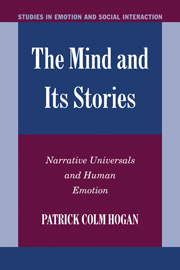Book contents
- Frontmatter
- Contents
- Acknowledgments
- The Mind and Its Stories
- Introduction: Studying Narrative, Studying Emotion
- 1 Literary Universals
- 2 Emotion and Suggestion: Lexical Processes in Literary Experience
- 3 Four Hypotheses on Emotion and Narrative
- 4 Writing Beyond the Ending: A Problem of Narrative, Empathy, and Ethics
- 5 Extending the Theory: Emotion Prototypes, Narrative Junctures, and Lyric Poetry
- 6 Testing, Revision, and the Program of Research in Narrative Universals: Ainu Epic and the Plot of Sacrifice
- 7 The Structure of Stories: Some General Principles of Plot
- Afterword: From the Emotional Nature of Narrative to the Narrative Nature of Emotion
- Works Cited
- Index
- Titles in the series
6 - Testing, Revision, and the Program of Research in Narrative Universals: Ainu Epic and the Plot of Sacrifice
Published online by Cambridge University Press: 11 July 2009
- Frontmatter
- Contents
- Acknowledgments
- The Mind and Its Stories
- Introduction: Studying Narrative, Studying Emotion
- 1 Literary Universals
- 2 Emotion and Suggestion: Lexical Processes in Literary Experience
- 3 Four Hypotheses on Emotion and Narrative
- 4 Writing Beyond the Ending: A Problem of Narrative, Empathy, and Ethics
- 5 Extending the Theory: Emotion Prototypes, Narrative Junctures, and Lyric Poetry
- 6 Testing, Revision, and the Program of Research in Narrative Universals: Ainu Epic and the Plot of Sacrifice
- 7 The Structure of Stories: Some General Principles of Plot
- Afterword: From the Emotional Nature of Narrative to the Narrative Nature of Emotion
- Works Cited
- Index
- Titles in the series
Summary
TESTING AND RESEARCH PROGRAMS IN LITERARY NARRATIVE
As I have already stressed in the Introduction, the work of Imre Lakatos suggests that the greatest value of a theory lies in the research program that it enables. Specifically, Lakatos distinguishes between “progressive” and “degenerating” research programs. Both encounter anomalous data. Both uncover phenomena that contradict their theoretical predictions. The difference is that a degenerating research program deals with recalcitrant data through ad hoc formulations. In other words, a degenerating research program formulates principles that account for the recalcitrant data, but do not explain anything beyond those data. In contrast, a progressive research program is continually reformulating its constituent theories in such a way as to expand the explanatory scope of those theories beyond any recalcitrant data. Indeed, a progressive research program actually seeks out recalcitrant data as a way of increasing explanatory reach and precision.
The most obvious way of generating new data – recalcitrant or not – is laboratory experimentation. When engaging in experimentation, we artificially create circumstances in which our hypotheses might prove problematic. In other words, we create situations in which our theory may not work, situations in which events may develop in a way that contradicts predictions made by our theory. This sort of experimentation is possible for certain areas of literary research, including research in narrative. It is important and should be pursued much more vigorously than has been done in the past.
- Type
- Chapter
- Information
- The Mind and its StoriesNarrative Universals and Human Emotion, pp. 172 - 201Publisher: Cambridge University PressPrint publication year: 2003



